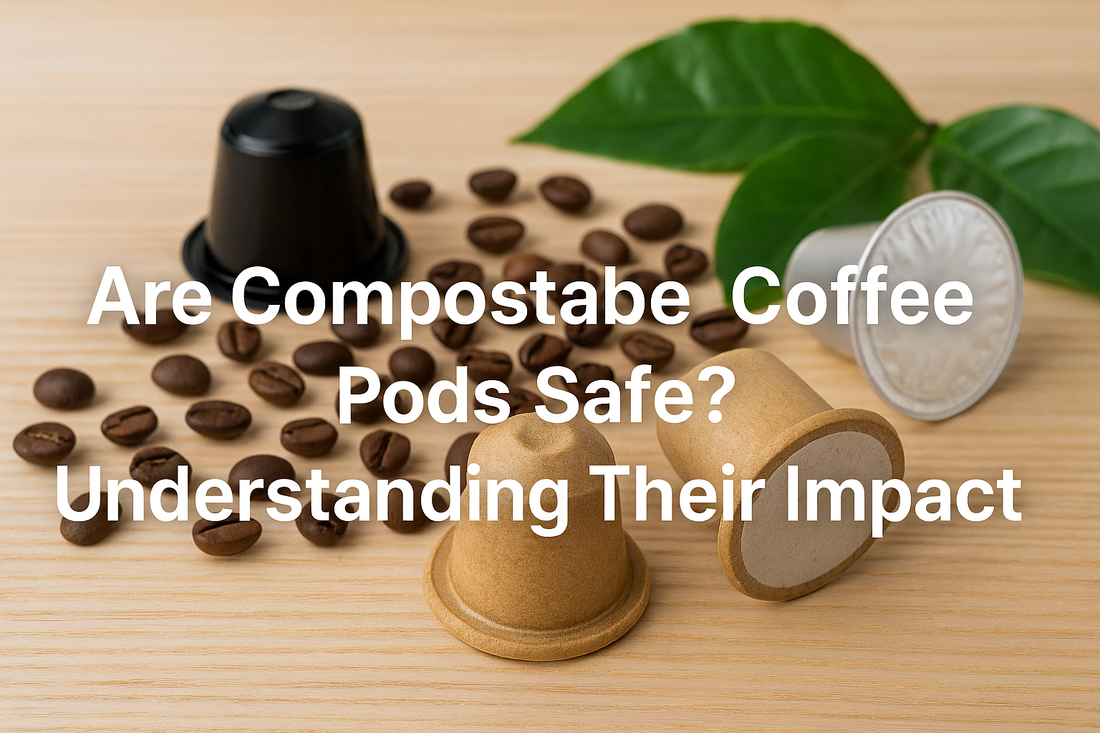Coffee pods are a convenient way to brew a single cup of coffee, but concerns have been raised about their safety for human health. With plastic pods linked to chemical migration and aluminum pods associated with potential long-term exposure concerns, compostable coffee pods are increasingly being viewed as a safer alternative. This blog explores what makes them different and whether they are truly safe for everyday use.
Table of Contents
What Are Compostable Coffee Pods and How Do They Work?
The Composition of Compostable Coffee Pods
Comparing Compostable, Plastic, and Aluminum Pods
Understanding Health Safety and Chemical Migration
Evaluating Compostable Pods in Everyday Use
Frequently Asked Questions
Recommended Reading
Quick Summary
- Compostable pods are made from renewable plant-based materials.
- Certified compostable pods are tested to ensure food safety.
- Plastic pods can release harmful chemicals into coffee.
- Aluminum pods may contribute to long-term exposure risks.
- Compostable pods, when certified, present the safest option for human health.
What Are Compostable Coffee Pods and How Do They Work?
Compostable coffee pods are made from renewable plant-based materials that break down under industrial composting conditions. Unlike plastic or aluminum pods, which can take centuries to degrade, compostable pods are designed to decompose into nutrient-rich organic matter within weeks. Their purpose is to reduce waste while also providing a safer option for consumers. There are different types of compostable coffee pods. Home Compostable, compost exactly like food, industrially compostable require an industrial composting process to fully decompose.
The Composition of Compostable Coffee Pods
Most compostable pods are made from biopolymers such as polylactic acid (PLA), plant starches, and cellulose fibres. These materials are tested and certified for food safety in the European Union, ensuring that they do not release harmful chemicals when in contact with hot beverages.
Comparing Compostable, Plastic, and Aluminum Pods
Plastic pods often contain polypropylene or polystyrene. Under brewing conditions, these plastics can release phthalates and other endocrine-disrupting chemicals into coffee.
Aluminum pods are generally lined with a protective layer to prevent direct contact between the coffee and metal. While this reduces leaching, studies in the EU have raised concerns about long-term aluminum exposure in the diet.
Compostable pods, certified under the EU’s EN 13432 standard are engineered to withstand brewing temperatures without releasing harmful substances. This makes them a significantly safer choice for human health compared to plastic or aluminum pods. The highest level of certification is the 4-star OK Biobased rating, the most sustainable material choice available in the capsule market . This rating confirms that more than 80 percent of the pod is made from renewable plant-based materials.
| Coffee Pod Type | Composition | Health Concerns | Safety Profile |
|---|---|---|---|
| Plastic Pods | Polypropylene, polystyrene, additives (BPA, phthalates) | Chemical migration, endocrine disruption, microplastics | Higher risk |
| Aluminum Pods | Aluminum shell with food-safe lining | Low-level aluminum exposure, phthalates from linings | Moderate risk |
| Compostable Pods (e.g. Aromatico Home Compostable Coffee Pods) | PLA, cellulose, plant-based polymers, | Certified compostable, 4-star OK Biobased is the highest rating for renewable content low migration risk, EU food safety compliant | Safest option |
Understanding Health Safety and Chemical Migration
One of the main concerns with any pod material is chemical migration the transfer of substances from the packaging into the drink. EU regulations on food contact materials (Regulation EC No 1935/2004) set strict safety thresholds to limit this risk. Compostable pods that meet these standards, are considered safe for everyday use.
By contrast, studies in Europe have repeatedly flagged plastic packaging as a key source of microplastics and hormone-disrupting substances. Choosing compostable alternatives significantly reduces exposure to these risks.
Evaluating Compostable Pods in Everyday Use
For consumers, safety is as important as sustainability. Compostable pods not only help address waste issues but also minimise health risks linked to traditional plastic and aluminum options. With certifications like OK Biobased 4-star and compliance with EU food safety standards, they are increasingly recognised as a trusted solution for households across Ireland and the EU.
Fzin Coffee has partnered with Mokador SRL to bring Aromatico Home Compostable Coffee Pods to the Irish market. These pods are 4-star OK Biobased certified, ensuring both safety and sustainability. The 4-star OK Biobased rating, is a world wide accredited assurance by TUV that over 80 percent of their carbon content comes from renewable resources. Technical inspection organizations like TÜV conduct independent tests and certifications to ensure products, services, and systems meet safety and quality standards
Frequently Asked Questions
Are compostable coffee pods safe for the environment?
Yes. Unlike traditional plastic or aluminium capsules, compostable coffee pods are made from plant-based materials and do not contain fossil plastics. This makes them a far better option for reducing long-term waste.
How do compostable coffee pods break down?
Home Compostable Coffee pods break down naturally, the same way food does. Industrially compostable coffee pods decompose under controlled industrial composting conditions within 12 to 16 weeks.
Do compostable coffee pods contain harmful substances?
Some pods can break down in a natural composting environment, while others require the higher heat and controlled conditions of industrial composting. In these facilities, the pods typically decompose within 12 to 16 weeks, turning into nutrient-rich compost instead of long-term waste.
What materials are used in compostable coffee pods?
They are often made from renewable plant-based materials such as cornstarch, sugarcane fibres, and biodegradable polymers.
